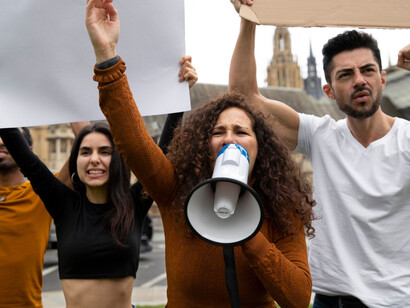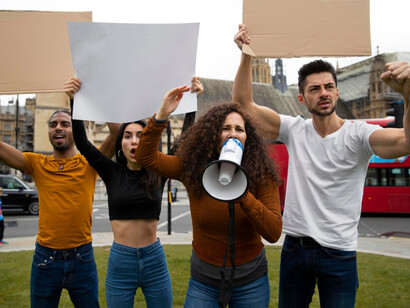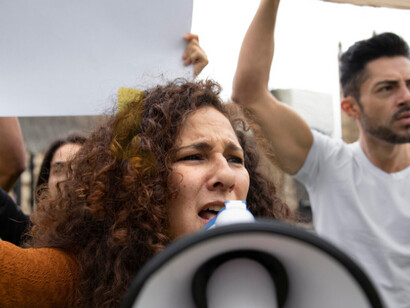During a mindless scroll, I stumbled upon a viral thread on X. A netizen posed the question, "Which is harder: life after a breakup or life after college?" The top comment responded, "Life after an election."
For many Indonesians, this sentiment is no exaggeration. The transition from one administration to another is rarely smooth, but the 2024 election left particularly deep divisions. Since the inauguration of President Prabowo Subianto and Vice President Gibran Rakabuming Raka in October, political tensions have remained high. The aftermath has been shaped not just by policy shifts, but also by the increasingly influential role of digital political narratives—a realm dominated by influencers, political operatives, and social media buzzers.
These forces, which played a crucial role in shaping electoral perceptions, continue to define public discourse, often blurring the lines between reality, propaganda, and misinformation. As Indonesia navigates this new era, questions about governance, accountability, and public trust loom large.
A cabinet of controversies
One of the earliest flashpoints of this administration was its record-breaking cabinet size. Dubbed the "Red and White Cabinet," it consists of 109 members, making it Indonesia’s largest governing body since the 1960s (Tempo, 2024). While President Prabowo defended this as a means to ensure efficiency and inclusivity, critics argue that it reflects an expansion of patronage politics—a system where political allies, business figures, and social media influencers receive government positions in exchange for their support.
The composition of the cabinet raises further concerns. Approximately 56% of its members are political appointees, while only 16% have backgrounds as professionals or experts (The Jakarta Post, 2024). Among the most debated appointments were Deddy Corbuzier, a former magician and YouTuber, as a special adviser for public communication in the Defense Ministry, and Raffi Ahmad, a television host, as a presidential envoy for youth and the arts. While their supporters argue that their large followings can help engage younger demographics in governance, critics see their appointments as part of a broader trend—leveraging high-profile figures to shape public perception rather than focusing on policy expertise.
This approach aligns with how the 2024 election campaign was conducted. With Gen Z and Millennials making up 56% of the voter base (Kompas, 2024), the election strategy relied heavily on influencers and viral digital narratives. This tactic resonated particularly with younger voters, many of whom consume news primarily through social media, where such narratives often spread faster than fact-based analyses.
Adding to the controversy was the candidacy of Gibran Rakabuming Raka. As the son of outgoing President Joko Widodo, Gibran’s sudden eligibility—made possible by a last-minute Constitutional Court ruling that lowered the minimum age requirement—raised serious concerns about judicial independence. The fact that the ruling was presided over by Jokowi’s brother-in-law only fueled allegations of dynastic politics and institutional interference (Reuters, 2024).
While political dynasties are not unique to Indonesia, this particular maneuver left many questioning whether the election had been structurally skewed in favor of continuity rather than change. Policy Challenges and Public Backlash Since taking office, the administration has faced growing public dissatisfaction, particularly over economic issues and governance decisions.
One of the earliest flashpoints was a rumored tax hike, which initially sparked nationwide protests before the government clarified that the increase would apply only to luxury goods. While this clarification eased tensions, it also highlighted deeper issues—a lack of clear communication and lingering skepticism about policy transparency. Given that Indonesia already had luxury tax regulations in place (Government Regulation No. 23/2019), many questioned whether the reform was truly necessary or simply a means to increase revenue amid economic challenges.
The Free Meal Program, one of the administration’s flagship initiatives, also faced significant hurdles. Originally mentioned as an off-the-cuff debate remark, it quickly turned into one of Indonesia’s most ambitious policies, with the goal of reducing child stunting. However, public health experts pointed out that stunting prevention is more closely linked to maternal and infant nutrition rather than feeding school-aged children.
The program’s rushed implementation led to multiple food poisoning cases, and concerns about corruption emerged when contracts were awarded to catering companies with military ties. While the program’s 420 trillion rupiah budget demonstrates a commitment to social welfare, execution problems have overshadowed its intended benefits.
Meanwhile, Indonesia’s economic landscape remains uncertain. The rupiah recently fell to its lowest value since 1998, prompting the government to implement $18.8 billion in budget cuts. Sectors such as public works saw funding reductions of up to 73%, leading to stalled infrastructure projects and job losses. Critics argue that these cuts contradict the administration’s claim of pursuing efficiency, especially given its oversized cabinet.
At the same time, concerns about government transparency are growing. The proposed state investment fund, Danatara, has yet to appear in the National Legislation Program (Prolegnas), raising fears about its legal oversight and potential for unchecked spending. This concern is compounded by the appointment of convicted corruptors to advisory positions, further shaking public trust in the administration’s commitment to reform.
KaburAjaDulu: The migration dilemma and nationalism debate
Against this backdrop of economic uncertainty and political tension, a new trend has emerged: #KaburAjaDulu (Just Run Away First). More young Indonesians are sharing migration plans, visa tips, and personal stories of seeking opportunities abroad—not just for economic reasons, but as a response to deepening political disillusionment.
Rather than addressing these concerns directly, some officials have dismissed the phenomenon outright, suggesting that those who dislike the government should simply leave the country. Meanwhile, others have accused emigrants of lacking nationalism, even proposing loyalty tests for Indonesians abroad. This rhetoric reflects a deeper struggle over national identity: is patriotism about blind loyalty to the state, or about holding leaders accountable to democratic principles? The increasing number of young Indonesians choosing to leave suggests that for many, the answer lies not in submission, but in the pursuit of a better future elsewhere.
Navigating the road ahead
At a time when political tensions are high, disengagement might seem like the only way to preserve mental well-being. Some Indonesians have turned to hobbies, community-building, or even reducing their news consumption to cope with political fatigue. Yet, even the most mundane aspects of daily life—grocery prices, taxes, and job stability—are shaped by policy decisions.
With revisions to the National Army and National Police bills on the horizon, concerns about digital censorship and the silencing of dissent are growing. If unchecked, this could mark a shift toward a governance model that prioritizes control over accountability.
Yet, history has shown that political landscapes are never static. Democratic resilience is built through persistent civic engagement—whether through activism, independent journalism, or legal advocacy. While individual actions may seem small, collective efforts have the power to shift narratives and demand accountability.
For those considering migration, it is a deeply personal choice. But for those who stay, resilience remains key. Change is rarely immediate, but history has favored those who refuse to accept decline as an endpoint. Indonesia has faced challenges before—and emerged stronger. Whether by staying or leaving, the task remains the same: ensuring that hope is not just an idea, but a foundation for future action.















